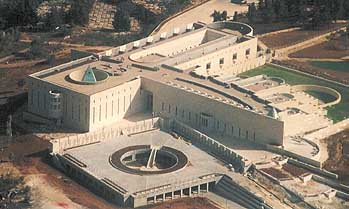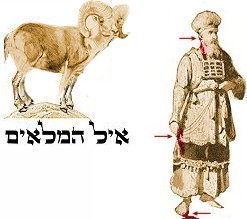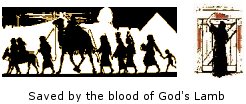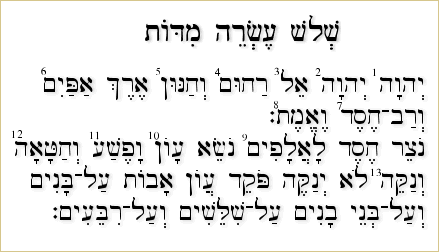|
|
|||||||||||||||||||||
 |
|||||||||||||||||||||
|
Learn Hebrew |
|||||||||||||||||||||
 |
|||||||||||||||||||||
|
Learn Torah |
|||||||||||||||||||||
|
March 2007 Updates 03.30.07 (Nisan 11, 5767) Monday evening (April 2nd) at sundown is Passover, the time when we commemorate the death of Jesus as Seh Elohim, the Lamb of God who takes away the sin of the world. Cleanse out the old leaven that you may be a new lump, as you really are unleavened. For Christ, our Passover lamb, has been sacrificed. Let us therefore celebrate the festival, not with the old leaven, the leaven of malice and evil, but with the unleavened bread of sincerity and truth. 1 Cor 5:7-8 Meanwhile, I will attempt to make a PDF file of the entire Passover Seder online so that you can print it for use as your own Haggadah. I wish you and your family a time of joy and shalom for this coming Passover season! Pesach Sameach! May the LORD God of Israel bless you and help you to more fully love Him and walk in His truth. Worthy is the Lamb who was slain, to receive power and wealth and wisdom and might and honor and glory and blessing! Amen.
03.28.07 (Nisan 9, 5767) I have been working feverishly to get the Passover Seder material online before Erev Pesach (Monday, April 2). Today I revised almost every part, including adding new sound files. I also wrote completely new material the Tzafun and Barech sections. Of particular interest to most of you will be the connection between what is commonly referred to as the Lord's Supper (or Communion) and Jesus' Passover Seder on the night He was betrayed. I hope you will find my efforts helpful in your understanding and faith in the LORD God of Israel.  IY"H I will convert all 15 steps of the Seder into a convenient PDF file that you can use to practice reading your own Haggadah, but time is short and I must find some time to sleep! The LORD is good to me, however, and I praise His glorious Name for all He has done in my life... He's the reason I labor as I do, and He supplies me strength. Please take some time looking over the Passover Seder pages in order to better appreciate the awesome sacrifice that Yeshua has given on our behalf... And please pray for this ministry... Sometimes it's a lonely work and often misunderstood by those steeped in various Church traditions. Todah chaverim...
03.27.07 (Nisan 8, 5767) Today I continued working on the online Passover Seder. I updated almost every part of it and added completely new material on the Shulchan Orech (the meal itself) and the Tzafun sections. I also included a new Hebrew blessing thanking God that Jesus is the Bread of Life. 
03.26.07 (Nisan 7, 5767) I am continuing to add new material to the Passover Section, to help you prepare to read your Haggadah for your upcoming Seder. Today I added more material to the Maggid section, as well as the Rachtzah, Motzi, Maror, and Korech sections. Sadly, I do not have the time to go into these with the depth they deserve, though (IY"H) if I can find the time, I will add additional Messianic insights to each of the traditional steps of the Seder. Shabbat HaGadol This coming Shabbat, which precedes Passover, is called Shabbat HaGadol ("Great Sabbath") to commemorate the time when the Exodus generation set aside the Pascal lamb for the original Passover. An additional (musaf) haftarah reading comes from Malachi 3:4-24. Note that Shabbat HaGadol is not observed on the (Biblical) date of Nisan 10, however, since Jewish tradition reserves this date for the fast of Miriam, who was said to have died on the 10th of Nisan.  This Shabbat is called gadol ("great") either because God miraculously allowed the Israelites to take lambs from among the Egyptians (despite the humiliation of their deity Amun), or because of the civil war that broke out among the Egyptians (which further enabled Israel to escape from Egypt). During Temple times, it was customary to obtain the Korban Pesach (Passover Lamb) four days before Passover so that worshippers could make sure that their lambs had no blemishes which would preclude them from being offered as sacrifices. It was on this day that the Mashiach Yeshua triumphantly entered Jerusalem (the "house" of Israel) before the Passover. Examined for four days before His sacrifice (execution) for the sins of the world, He was found to be the true Lamb of God (seh haElohim) without spot or blemish. The blood of the eil ha-milu'im was put on the right ear, right thumb, and big toe of the Aaron and his sons (a clear picture of Yeshua and His sacrifice as the coming greater High Priest) and the rest of the blood was dashed upon the sides of the mizbeach. After its slaughter, Moses also took the innards of the eil hamilu'im and some unleavened bread and put them in the hands of the priests to perform tenufah (a wave offering) before burning them upon the altar (a picture of the resurrection). Finally, Moses mixed some of the blood of the eil hamilu'im and anointing oil and sprinkled it on the priest's garments to sanctify them.
03.21.07 (Nisan 2, 5767) I updated the weekly Torah portion for this coming Shabbat (Vayikra) and created a new PDF file for you to download. This parashah reading is especially appropriate at this time of year, since Passover is just a couple weeks away. Learn about the importance of semichah, viduy, and blood atonement to help you become spiritually prepared to "keep the feast" (1 Cor. 5:8). 
Biblical New Years Day 03.20.07 (Nisan 1, 5767) HAPPY NEW YEAR TO YOU ALL!  Today is the Biblical New Years Day, the start of the month of the Exodus from Egypt and the beginning of Jewish national history. It is also the first month used for counting the festivals (mo'edim) of the Hebrew Calendar and for reckoning the years of reign of the Kings of Israel. May the LORD God of Israel bless you and give you grace for another year of life...
03.15.07 (Adar 25, 5767) I am still adding Pesach (Passover) material for you to practice your Hebrew reading for the big night on April 2nd. Today I continued with the Maggid section, adding additional audio and the list of Eser HaMakot - the Ten Plagues.  Unfortunately, on account of my schedule and the struggle I have with chronic pain, I cannot be as thorough as I would like regarding Haggadah material. Perhaps next year in Jerusalem? Seriously, every day I struggle with a lot of fatigue, joint and bone pain, and other symptoms. There are times I think I am literally dying, especially when I try to sleep at night. Last night was paradigmatic for me: pain, tossing, turning, and waking up feeling like I had just escaped from the torturer's rack...
03.012.07 (Adar 22, 5767) I updated the weekly Torah portion for this coming Shabbat (Vaiyakhel and Pekudei) and created two new PDF files for you to download. Besides including a "double portion" of Torah, this shabbat also is called Shabbat HaChodesh (the Sabbath of the Moon), since it is in preparation of the new moon of Nisan (the first month of the Jewish year and the start of the Jewish Biblical (as opposed to Rabbinical) calendar). An additional reading (Exodus 12:1-20 ) is added as a maftir in most synagogues). The Torah reading summary for this week will be late. I have been ill over the weekend, and yesterday I spent the entire day with Josiah ben Yisroel walking in the woods, shopping, and playing. I hope to get to it sometime by tomorrow evening. Please note that the Passover Seder section is still under construction, and I am hoping to get as much material online as I can over the next couple of weeks so that you can more comfortably read from your Haggadah. 03.09.07 (Adar 19, 5767) What is the State of Israel after the death of Christ? It seems I am asked this question all the time. I attempt to answer it in my recent article, "Israel and the Church - What's the Relationship?" In short, God is not "finished" with national Israel, even though there's a "partial hardening" until the fulness of the Gentiles come to faith (Rom 11:25), and then "all Israel will be saved" (Rom 11:26). The Church is actually made a part of she'arit yisrael - the faithful remnant of Israel (Rom 11:17), and not the other way around. The Gentile church shouldn't call faithful Jews away from their heritage, but rather should seek to embrace Jewish heritage as its own, since they are made co-heirs of the covenants unconditionally given to the Jewish people (Eph 2:11-13). So what's our response to all of this supposed to be? Should we abandon the traditional (gentilish) Church and become Jewish in our liturgy, etc? Not necessarily (though we should be careful to reject the errors of "Replacement Theology" and any liturgical elements that are at based upon it). We don't abandon the Church, but rather seek to remind her of who she really is. She's like an adopted child whose true father is a great King, though she thinks of herself as a "Cinderella" that is lowborn and unworthy. Or she's like the unnamed Shulamite woman in the Song of Solomon who was passionately beloved of the (hidden) great King. Indeed, the Church is called kallat Mashiach - the Bride of Messiah - and is composed of all those from among the nations whom God has sovereignly chosen to be in a love relationship with Him. King David was served in his elderly years by a young woman named Abishag (Avishag of 1 Kings 1:1-4, 15) who was perhaps this Shulamite woman (from the city of Shunem). Later, King Solomon's first wife was perhaps the same beautiful nurse who served his father. Similarly, the Church is precious to the LORD (typified by King Solomon), even as Abishag was indeed faithful to David and she'arit Yisrael. Perhaps one additional note on this subject should be made. There is a distinction to be made between the secular state of Israel and she'arit yisrael, the chosen remnant (including those yet to be chosen in the future). This implies, among other things, that the secular state is not to be identified with any form of theocracy and does not itself hold any sacred status. God is sovereign over all the nations, including secular Israel, of course, but the secular state of Israel is actually a part of the acharit hayamim (end times) theater of operations. This is evidenced by many of the New World Order designs found on secular Israel's governmental buildings, most particularly the Israeli Supreme Court building:  Notice the key symbol of the all-seeing eye of providence on the roof of the building, which can possibly be traced back to Egyptian mythology and the Eye of Horus. This is essentially the same symbol used on the Great Seal of the United States, which openly avows adherence to Novus Ordo Seclorum - a Latin phase that can be translated as "A New Order of the Ages," or even as "a New World Order."
03.07.07 (Adar 17, 5767) I am continuing to get the basic information for the Passover seder online. Today I started on the fourth step of the traditional seder, called Yachatz ("broken"). There are many allusions to the sacrificial work of Yeshua as Seh Elohim (the Lamb of God) embedded within the Passover Seder, and the mysterious afikomen is one of them.  Note that the Seder material is a work in progress, and I hope to get written and put online as time permits. "Beware of the Concision" 03.06.07 (Adar 16, 5767) I completed the list of the 613 commandments found in the Torah. Actually, I have provided you with two lists -- one that sequentially goes through the Torah and lists the commandments from Genesis through Deuteronomy, and another that is considered (more or less) the standard version as given by Maimonides, the grand sage of the Rabbinical tradition. You can learn more by clicking the image below: As you know, there are some people within the Messianic movement (as well as legalistic churches) who claim that followers of Jesus should become "Torah Observant." Since Jesus was a Torah-observant Jew, the argument goes, and we are called to be His followers, then we ourselves should become Torah observant, too. As well-meaning as this sounds, however, this is specious reasoning, based on a variety of exegetical errors, not the least of which is the confusion between the idea of Torah and Covenant. Nonetheless, I wonder if these legalists have ever taken the time to actually read the list of the Torah's demands -- all 613 of them? For starters, let me list just a few of them here. Each of the following is a commandment found in the Torah of Moses:
Need I go on? The point here is simple: the law code given to ancient Israel was not, and was never intended to be, an unchanging set of laws that would determine someone's relationship with God. Those who want to return to the ethic of ancient Israel perhaps need to be reminded of Jesus' words in Matthew 23:15, wherein He warned otherwise well-meaning people of the dangers of affecting self-righteousness, and they also might want to reread Galatians 4:21-5:1 where Paul likens those who advocate adherence to the law as slaves (i.e., children of Hagar), but those who hold to the promise of the gift of life through faith as free (i.e., children of Sarah). Is the law then contrary to the promises of God? Certainly not! For if a law had been given that could give life, then righteousness would indeed be by the law. But the Scripture imprisoned everything under sin, so that the promise by faith in Jesus Christ might be given to those who believe. Now before faith came, we were held captive under the law, imprisoned until the coming faith would be revealed. So then, the law was our guardian until Christ came, in order that we might be justified by faith. But now that faith has come, we are no longer under a guardian, for in Christ Jesus you are all sons of God, through faith (Gal. 3:21-26). The law of the LORD is indeed perfect (Psalm 19:7), yet we are fallible and in need of salvation from the righteous judgment of an utterly holy God based on our (chronically) sinful condition.
03.05.07 (Adar 15, 5767) Now that Purim is over, it's time to think about getting ready for Passover! To that end, I am attempting to find time to update the online Passover Seder section, and today I added the third step of the traditional Seder, Karpas.  It's a very big task to get all the Hebrew and audio recorded (not to mention developing the page content) for the traditional Seder. Last year I ran out of time doing this, so please offer up a prayer to the LORD God of Israel that I can find the time and strength to complete the task this year...
03.04.07 (Adar 14, 5767) I updated the weekly Torah portion for this coming Shabbat (Ki Tisa) and created a new PDF file for you to download.   Among other things of this fascinating parashah, you can learn about Betzalel, and how this grandson of Miriam (Moses' sister) foreshadows the work of Jesus as the Builder of the Temple of the LORD.
This week's parashah includes something very special: the thirty-two words (Exod. 34:6-7) that have become known in Jewish tradition as the Shelosh Esrei Middot, the Thirteen Attributes of God.
|
||||||||||||||||||||||||||||||
|
Hebrew for Christians |
||||||||||||||||||||||||||||||
|
||||||||||||||||||||||||||||||















